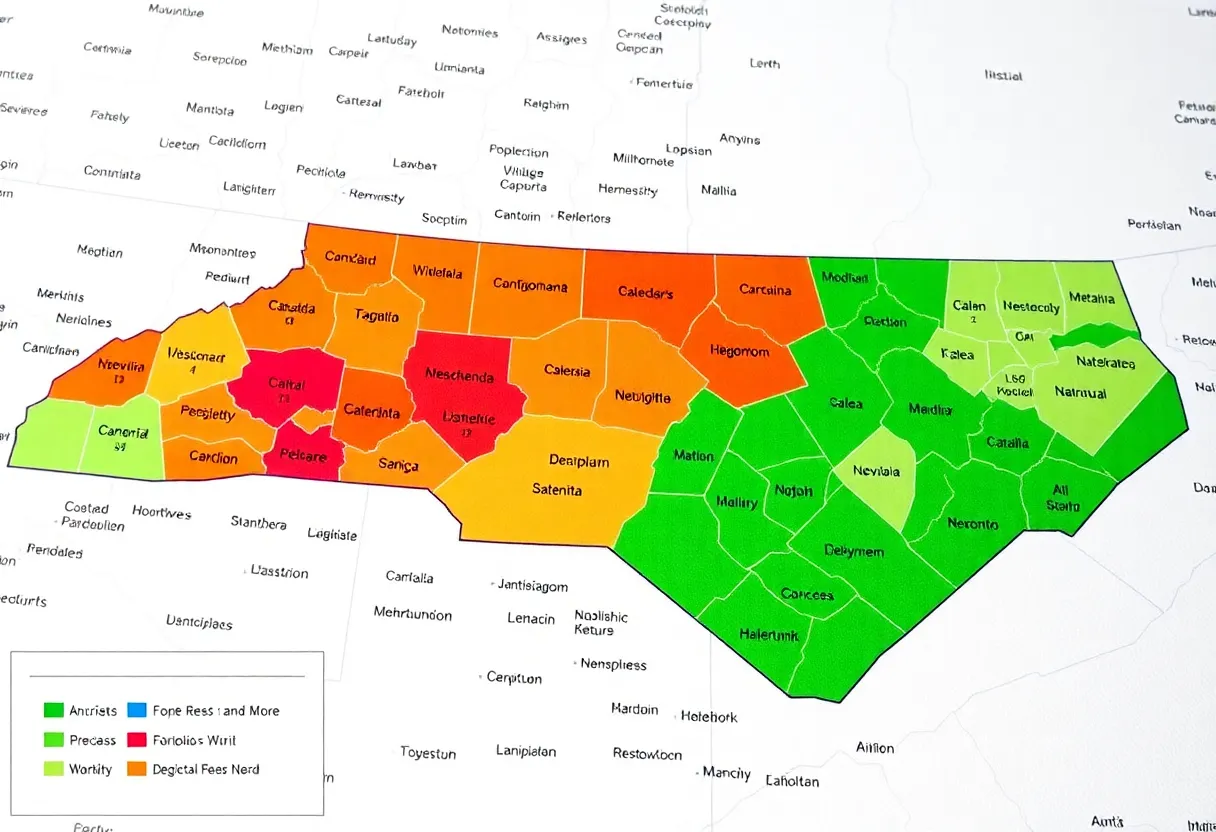North Carolina, October 15, 2025
North Carolina is preparing for a significant debate on the redistricting of congressional maps, a move that may shift district boundaries to benefit one political party. This development is part of a broader national trend of partisan redistricting that could dramatically affect election outcomes and the representation of diverse populations. Advocates and critics are gearing up for a contentious discussion, as changes to district boundaries may profoundly impact future elections and governance in the state.
Raleigh, North Carolina
North Carolina Republican legislative leaders have announced plans to vote on redrawing the state’s U.S. House district map, aiming to secure an additional Republican seat within existing right-leaning boundaries. This move aligns with a nationwide trend of mid-decade redistricting battles ahead of the 2026 midterm elections.
Details of the Proposed Redistricting
The proposed redistricting seeks to adjust the 1st Congressional District, currently held by Democratic Representative Don Davis, to favor Republican candidates. In the 2024 elections, Davis won re-election by a narrow margin of less than 2 percentage points. By modifying portions of this district, Republicans aim to increase their representation in the state. This initiative follows a 2023 redistricting that resulted in GOP candidates winning 10 of North Carolina’s 14 U.S. House seats, compared to a 7-7 split in 2022.
National Context
This redistricting effort is part of a broader national trend where Republican-led states, including Texas and Missouri, are revising congressional maps to gain seats, while Democrat-led states like California are undertaking similar actions. Critics argue that such moves constitute partisan gerrymandering, potentially undermining fair representation. Legal challenges have been filed in North Carolina, with advocacy groups alleging racial discrimination and voter dilution. The state’s Democratic governor cannot veto redistricting plans, allowing Republicans to implement changes without gubernatorial approval.
Public Opinion
A recent poll indicates that 84% of North Carolina voters, including 87% of Democrats and 78% of Republicans, oppose redrawing voting maps for partisan advantage. The survey suggests a strong bipartisan consensus against gerrymandering practices, with 76% of respondents believing it should be illegal.
Background on Redistricting in North Carolina
Redistricting in North Carolina has a complex history, with previous legal challenges addressing racial gerrymandering. In the 1996 Supreme Court case Shaw v. Hunt, the Court ruled that the state’s congressional redistricting violated the Equal Protection Clause of the Fourteenth Amendment. More recently, in 2017, the Court in Cooper v. Harris found that North Carolina relied too heavily on race in redrawing two congressional districts following the 2010 Census. These cases highlight the ongoing legal scrutiny of redistricting practices in the state.
Implications for the 2026 Elections
The proposed redistricting could significantly impact the 2026 midterm elections. With Democrats needing to gain only three seats to flip the House, the outcome of these redistricting efforts may influence the balance of power in Congress. The situation underscores the importance of fair and transparent redistricting processes to ensure equitable representation for all voters.
Related Developments
In related news, Democrat Richard Ojeda has raised nearly $1.2 million in his attempt to unseat Republican Richard Hudson, chair of the National Republican Congressional Committee, in North Carolina. This significant fundraising effort highlights the competitive nature of North Carolina’s congressional races and the influence of redistricting on electoral dynamics.
Frequently Asked Questions
- What is the purpose of the proposed redistricting in North Carolina?
- The proposed redistricting aims to adjust the 1st Congressional District to favor Republican candidates, potentially increasing the state’s Republican representation in the U.S. House.
- How does this redistricting effort fit into the national context?
- This effort is part of a broader national trend where Republican-led states are revising congressional maps to gain seats, while Democrat-led states are undertaking similar actions, leading to debates over partisan gerrymandering.
- What is the public opinion on redistricting in North Carolina?
- A recent poll indicates that 84% of North Carolina voters oppose redrawing voting maps for partisan advantage, with a strong bipartisan consensus against gerrymandering practices.
- What is the history of redistricting in North Carolina?
- North Carolina has a complex history of redistricting, with legal challenges addressing racial gerrymandering, including the 1996 Supreme Court case Shaw v. Hunt and the 2017 case Cooper v. Harris.
- How could the proposed redistricting impact the 2026 elections?
- The redistricting could significantly impact the 2026 midterm elections, potentially influencing the balance of power in Congress, as Democrats need to gain only three seats to flip the House.
Chart: Key Features of North Carolina’s Proposed Redistricting
| Feature | Details |
|---|---|
| Proposed Change | Adjust 1st Congressional District to favor Republican candidates |
| Current Representation | 10 Republican-held seats, 4 Democratic-held seats |
| 2024 Election Outcome | Democratic Representative Don Davis re-elected by less than 2 percentage points |
| Public Opinion | 84% of voters oppose redrawing maps for partisan advantage |
| Legal Challenges | Advocacy groups allege racial discrimination and voter dilution |
| Governor’s Stance | Democratic Governor Josh Stein opposes mid-decade redistricting |
Deeper Dive: News & Info About This Topic
HERE Resources
Author: Construction NC News
NORTH CAROLINA STAFF WRITER The NORTH CAROLINA STAFF WRITER represents the experienced team at constructionncnews.com, your go-to source for actionable local news and information in North Carolina and beyond. Specializing in "news you can use," we cover essential topics like product reviews for personal and business needs, local business directories, politics, real estate trends, neighborhood insights, and state news affecting the area—with deep expertise drawn from years of dedicated reporting and strong community input, including local press releases and business updates. We deliver top reporting on high-value events such as the North Carolina Build Expo, major infrastructure projects, and advancements in construction technology showcases. Our coverage extends to key organizations like the Associated Builders and Contractors of the Carolinas and the North Carolina Home Builders Association, plus leading businesses in construction and legal services that power the local economy such as CMiC Global and Womble Bond Dickinson LLP. As part of the broader network, including constructioncanews.com, constructionnynews.com, and constructiontxnews.com, we provide comprehensive, credible insights into the dynamic construction landscape across multiple states.





